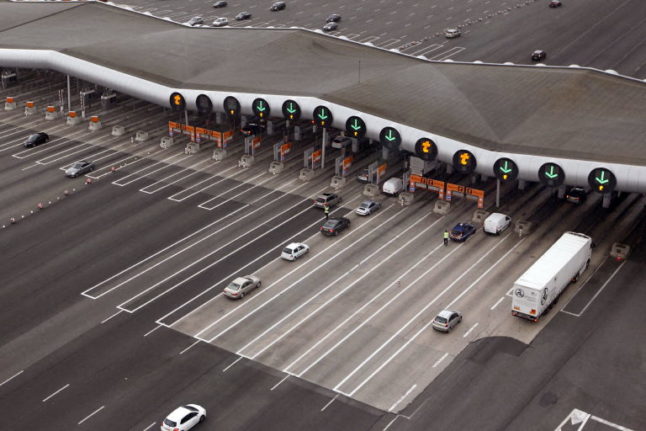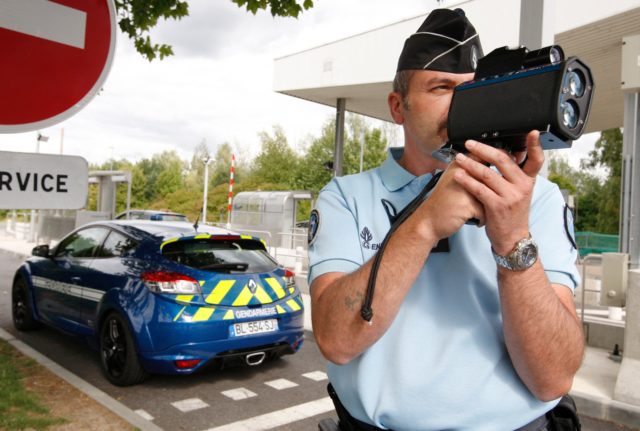The way motorists in France pay for tolls on motorways is changing. ‘Free-flow’ tollbooths with sensors and cameras are set to be introduced on some autoroutes – allow people to drive straight through and pay later, either online or at the tabac.
In an interview with Ouest France on Sunday, Philippe Coy, the head of the national confederation for tobacconists (tabacs), said that motorways would replace their toll barriers with gates equipped with cameras that vehicles would drive under, confirming a plan that had been first announced in October 2023.
A sensor scan and an automatic photo of the vehicle will be taken, allowing people to keep driving without stopping – similar to the system in place at the Dartford Crossing in the UK.
The new French technology will first determine whether you have a pre-paid electronic toll badge (known as télépéage) in the car, then it will take note of the category of vehicle (make and model), plus the licence plate number to ensure the right person is billed.
Then, that person will be able to pay their bill either online or in person at certain tabacs afterwards. According to Coy, the option to pay at the tabac will be introduced during the second half of 2024, and it will be available at those that are equipped with the special ‘Nirio’ payment platform.
READ MORE: What is télépéage and how does it work?
Where will the new tolls be introduced?
It will start off on the Paris-Normandy axis, along the A13 and A14 motorways.
According to reporting by La Dépêche, the first ‘free-flow’ toll has already been installed at the Incarville tollbooth along the A13 in the Eure département.
The project will later be expanded to the A14 motorway by December 2024.
How will the payment work?
The plans to introduce free-flow tollbooths are to be headed up on autoroutes owned by the the North and Eastern motorway company (Société des Autoroutes du Nord et de l’Est de la France, or Sanef), although it is likely that other autoroute operators will follow, if it is a success.
As for the deadline for payment, according to Sanef you will have 72 hours to pay after passing through the toll.
To find out the amount to pay, you will either log onto the online payment platform via Sanef.com, or pay with the Nirio platform in the tabac. You will communicate your licence number to find your bill, and then you can pay either by card (online) or card/cash (in person).
Cheques will not be accepted, according to Actu France. The same process would also apply for hire cars.
You will also be able to pay in advance of your journey, if you prefer.
If you have a toll badge (the Liber-t tag) then as long as it is positioned in the windscreen, it will be read and detected when you pass through the toll. You can continue payments as normally with this option.
There will also be the choice to create a Sanef customer account on their website. You will be able to upload your vehicle’s licence number and a bank card to allow for automatic payment.
What about tourists, visitors and those with foreign-registered cars?
The system seems clear for those vehicles with a French number plate, but what about those whose vehicles are registered elsewhere, such as the tens of thousands and tourists and second-home owners who drive in France each year?
The Local put this question to one of the directors of the free-flow tollbooth project with Sanef, Joselito Bellet.
“The rules will be the same for both foreigners and for French motorists. We are trying our best to make sure the system works in the same way for everyone, even if they have a foreign vehicle,” Bellet said.
“People with vehicles with foreign licence plates will be able to pay using the Sanef website, in the same way as those with French vehicles.
“Both will enter their licence plate number and pay the fee, and both have 72 hours to pay. People driving foreign vehicles will also be able to create an account on the Sanef website too, so they can pay in advance if they like.
“We will soon begin working with the tourism offices, as well as the communication teams at the Eurotunnel and at the Port of Calais to help offer more information in English to foreign motorists.
“The Sanef payment website will also be available in English. We will set up a call centre with an English-language option, so people will be able to direct their questions there.”
For rental cars, Bellet explained that the process will be the same: they can either pay using their own personal toll badge (you can use this in different cars, as long as they are the same ‘class’), by creating an account ahead of time, or afterwards using the website or one of the participating tabacs.
He added that will put out flyers and reminders (in English) so that people do not forget to write down their rental vehicle’s licence plate number.
What if you forget to pay?
For those who forget to pay within the 72 hours, there will be a late fee applied.
Bellet explained that if you pay within two weeks of receiving the letter informing you that you forgot to pay, then the fee will only be €10. However, after two weeks, that penalty can go all the way up to €90.
For foreigners covered by the EU car registration system EUCARIS, you will receive a letter informing you that you forgot to pay and explaining (in both French and English) how you can do so and the fee structure if you do not do it right away.
For motorists with vehicles from non-EU countries, including the UK, he said “Sanef will pass through debt collection agencies in those countries and we will follow their local rules for this.”
Why offer payment at tabacs?
As smoking rates drop, tabacs are offering more services including administrative services such as paying bills or taxes.
Coy added that his “goal is to turn tabacs into everyday drugstores. That is to say, places where you can always find the product you want at the last minute: a gift, local products, batteries, headphones, or pens and paper.”
Tabacs are offering more services, including the ability to pay bills and fines, as well as purchasing ammunition (at some stores for eligible people).
READ MORE: Why the tabac is essential to life in France – even if you don’t smoke
In terms of hours, tabacs are usually open six days a week.



 Please whitelist us to continue reading.
Please whitelist us to continue reading.
The tag is by far the simplest and cheapest way to pay. Drive through the toll gate, or under the new cover and your distance, vehicle and toll are logged.
Nothing to do.
payment is collected the following month.
Looking for suggestions for those of us who rent cars occasionally. From our experience, by the time the rental company emails us notifications of charges, we are already late. I found payment online to be very convoluted. Can we get a tag each time we rent a car? Good for a week ? Or can we use the tag when driving DIFFERENT rental cars?
Replying to Kathy – we have a tag which we have used in our own cars and rental cars and it’s not car specific. You just need to place it or hold it up where it can be detected as you go through the toll.
We drive in France once or twice a year in a UK-registered car. What is the most practical course of action for holidaymakers like us? Will there still be lanes where payment can be made by credit card?